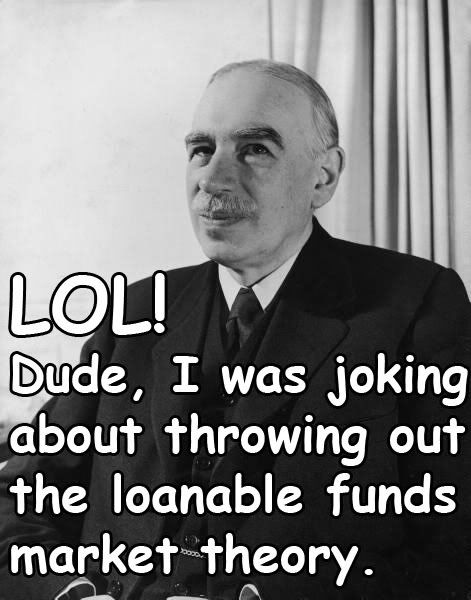"Government doesn't create jobs and build wealth; entrepreneurs, risk takers and private businesses do."
This part is true, but he's missing one of the most important pieces, which is savings.
Job creation comes from a mix of saving and spending. People's savings are what constitute investment, from your other posts I trust you're pretty much aware of how this works. I also trust you know who John Maynard Keynes is, if not his theories.
One of Keynes's many contributions to economics is the value of deficit spending (jump-starting a sluggish economy, and using mild inflation to help pay off the debt). Now when the only available money for investment comes from savings, it obviously puts a cap on how much can be lent out (and how much can be taxed). This ends up being a good thing which I'll explain in a minute.
In bad times people tend to save, and in good times they tend to spend. Thus theoretically the savings of the general population should go up in bad times giving banks money to lend, causing them to lower interest rates and get people to borrow this excess cash. In good times people spend money depleting their savings causing banks to raise their interest rate to give them incentive to start putting money back in again. This process causes the interest rate to hover around an equilibrium that is dictated by the free market. If some outside factor jars the economy like a war or natural disaster banks have to look at the market fundamentals to gauge the proper interest rate in light of this new situation.
Since the amount of money in the system is limited, lending institutions have to take care to lend the money in a wise manner. Too many bad loans and you start getting into trouble (I'm going to ignore the Fed in the following statements). If word gets out that the bank is stumbling, you will have a run on the bank making its death a self fulfilling prophecy. It also creates uneasiness in the public often triggering off other bank runs. So the banks need to keep high lending standards.
The problem with the government dumping borrowed money (I'm not getting into money creation yet) into the system is that first, it requires a LOT of money to jump-start an economy), and second the higher amount of money being lent out, the higher the chance of malinvestment, or investing in goods and services there is not enough demand to support on their own. The injection of money builds new goods and services creating jobs but you also have to tax the people to pay off the debt. This lowers spending allowing the malinvestment to show itself in the form of companies failing or shrinking thus kicking off a new round of trouble. Time for more borrowing, right?
Referring back to my comment on capping the amount of money in the system the Federal Reserve was created to shore up troubled banks thus reassuring the public their money is not threatened and in turn causing them to leave it in the bank. This buys the bank time to get back on its feet. What it also does is allow the banks to take more risk. Higher risk equals higher profits but it also means a higher chance of failure (from malinvestment). Well now failure is taken out of the equation. And since people and companies are going to put their money in the bank that gives them the highest return, banks are definitely going to take more risk in their lending to stay competitive. If shit fails they get bailed out and if not we get malinvestment. Now throw in a ten year long war and a (government induced) housing bubble (malinvestment), and a previous malinvestment causing stimulus from the tech bust we still need to pay off, and you have a lot of shit that is unsupportable. No problem. We'll borrow more and jump-start the economy and if nobody wants to lend us money we will just fire up the printing press and borrow from ourselves. This causes inflation which means people can buy less causing production to go down and people to get laid off... etc. Keynesian economists think this is good because it allows people (and governments) to pay off debts. This is true assuming you not only still have a job but a job where your salary rises with inflation. It also wipes out savings (the true wealth creation tool).

The teat party basically wants to let it burn and start over. This would work assuming the destruction and misery it inflicts on people wouldn't cause them to vote in some form of dictatorship (which would at least be humorously ironic

)
Democrats, if they say anything at all, want to spend more money.
Republicans float between those two options leaning towards whichever one makes the Democrats look worse and then saying, "I told you so."
P.S. Either way, none of this means Eric Cantor shouldn't go fuck himself.




